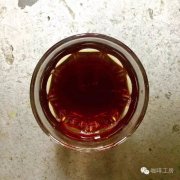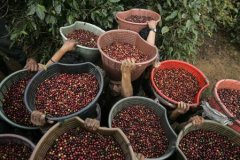Kenya AA's adorable charm and unique virgin fruit flavor

Professional coffee knowledge exchange More coffee bean information Please pay attention to coffee workshop (Weixin Official Accounts cafe_style)
Close to Ethiopia, Kenya is known worldwide for producing high-quality Arabica washed beans. Coffee was introduced to Kenya by the British around 1900. The vast majority of coffee beans are uniformly graded by the Kenya Coffee Bureau and then sold at auction. Kenya's coffee is divided into AA+, AA and AB. The coffee beans are graded according to the particle size uniformity, which also represents the quality to a certain extent. Kenya AA is the largest coffee bean grown in Kenya. It has complex flavor, sweet and sour blackberry fruit, thick and rich taste, bright, distinct personality and excellent texture.
High-quality Kenyan coffee beans are commonly grown between 1300 and 2100 meters above sea level, just below the equator in Kenya, where more than six million people are engaged in the coffee industry, mostly in the form of a combination of small farmers and cooperatives. The main growing areas include Ruiri, Thika, Kirinyaga, Mt. Kenya West, Nyeri, Kiambu and Muranga, dominated by Mount Kenya and Aberdare foothills. Many regions strive to preserve native forest ecosystems and protect natural gene pools. In 1930, a Kenyan unique variety SL28/SL34 was developed and named by Scott Laboratories (SL). SL28/SL34 is a genetic variant according to SL Laboratories.
SL28 is a blend of bourbon, mocha, and leaf ironbica, copper leaf color, and broad bean-like beans. It was hoped to combine high quality, pest resistant coffee beans with high yields. Although the yield of SL28 is not as good as expected, the flavor is excellent, sweet, balanced and complex, with significant citrus and dark plum characteristics. SL34 and SL28 taste similar, except complex acid and sweet finish, taste more intense than SL28, but also cleaner. SL34 is similar in appearance to SL28, with bourbon and more Tibica pedigree, but is better able to adapt to sudden heavy rains. Kenya has two coffee cherry growing seasons a year, the main season is October to December, and the second harvest season is April to June. Most coffee is washed completely and then dried in the sun on an African elevated bed.
Kenya strictly controls the quality of coffee, which is divided into AA, AB, C, E, PB, TT, T, ML and MH according to size and shape. These grades mainly distinguish the shape and size of beans, but do not represent the quality of beans. Many people believe that larger beans contain more fat that produces coffee aroma, and because of this, larger beans are more expensive on the market.
For example, Kenya AA, in the same class of beans, the highest grade is the manor bean, followed by "+", followed by the general AA, AB classification compared to AA, C class is the smaller beans, E class is the giant elephant beans, TT, T, ML, MH are the local only to see the bad beans.
PB (Peaberry)
In particular, round beans (PB) are usually produced at the end of coffee trees that bloom too late or too early. Due to the scarcity of production, they account for only 10% of the yield. The round beans produced by the same coffee tree are more expensive than other flat beans. When round beans are specially collected together, most defective beans will be eliminated. The proportion of defects will be reduced, and the particles will be more consistent, so that the roasting will be more uniform and the taste will be improved.
As for quality differentiation, Kenya uses a numerical grading system to distinguish coffee quality, but this numerical grading system is not well publicized, so few people know about it. Therefore, the classification is still based on the grain size first, and the PB class of different shapes is about AA, but if it is the manor class or + class, it will advance two or one level in the class. For example, AB manor beans are about AA+ and PB+.
Due to the different production conditions from year to year, the quality of coffee beans will be directly graded for reference only.

In recent years, more and more people love to drink coffee, and they know more and more about the taste and aroma of coffee. In the past, we must have heard the older generation always say,"Coffee must not be sour!" "If coffee is sour, it's bad coffee!" That kind of thing. Of course, looking back from the current point of view,"sour coffee = inferior coffee" has long been unrealistic and incorrect concept, but more and more coffee fans began to prefer coffee with acidity, and even can not be separated from sour coffee, especially in the female population of acid acceptance is higher. Of course, this may also be due to the relationship between time and space, early coffee refining technology is not as modern, the source is not transparent enough, perhaps also mixed with poor flavor, unpicked beans of coffee and roasted into a light roast, bad taste of course easier to drink clearly. In recent years, the popularity of fine coffee has begun to drive the taste of black coffee, and more and more attention has been paid to the sour, fragrant, sweet and alcoholic flavors of coffee itself. The word "sour coffee" has become a representative of coffee taste.
Kenyan coffee is most famous for its delicious sour taste. Here's a quick introduction to today's protagonist: Kenya AA !
production history
Country of manufacture: Kenya
Location: Kirinyaga
Grade: AA
Treatment method: washed
Type: SL28
Elevation: 1,700 - 1,950 m
Recent hand-brewed flavor description: Tropical fruit, blackberry, black vinegar, kumquat, citrus, cream, apricot, small tomato tomato flavor is very obvious (also can smell this unique flavor when grinding)
Those who like sour taste can taste this bean, which will bring you different flavor experience!~
Important Notice :
前街咖啡 FrontStreet Coffee has moved to new addredd:
FrontStreet Coffee Address: 315,Donghua East Road,GuangZhou
Tel:020 38364473
- Prev

What are the characteristics and advantages of the rise of Yunnan coffee in China to the road of high-quality coffee?
Professional coffee knowledge exchange more coffee bean information Please follow Coffee Workshop (Wechat official account cafe_style) in the recent Ministry of Foreign Affairs held the charm of Yunnan World sharing global promotion activity, Yunnan coffee blue hall, attracted the world's attention, Foreign Minister Wang Yi praised Yunnan coffee: it is the best coffee that I have traveled all over the world and tasted coffee from every country in the world. Cloud
- Next

Explore how the origin of Colombian Coca Coffee affects the flavor change and manual data recommendation.
Explore how the origin of Colombian cauca affects the flavor change. Although Cauca is one of the most popular producing areas of the COE Cup, it is not as well-known as other provinces and regions, so there have been auctions such as the Cauca Best Cup Cup since 2014, jointly organized by well-known American traders, local exporters and the Colombian Coffee Association. The first examination card in 2014
Related
- Detailed explanation of Jadeite planting Land in Panamanian Jadeite Manor introduction to the grading system of Jadeite competitive bidding, Red bid, Green bid and Rose Summer
- Story of Coffee planting in Brenka region of Costa Rica Stonehenge Manor anaerobic heavy honey treatment of flavor mouth
- What's on the barrel of Blue Mountain Coffee beans?
- Can American coffee also pull flowers? How to use hot American style to pull out a good-looking pattern?
- Can you make a cold extract with coffee beans? What is the right proportion for cold-extracted coffee formula?
- Indonesian PWN Gold Mandrine Coffee Origin Features Flavor How to Chong? Mandolin coffee is American.
- A brief introduction to the flavor characteristics of Brazilian yellow bourbon coffee beans
- What is the effect of different water quality on the flavor of cold-extracted coffee? What kind of water is best for brewing coffee?
- Why do you think of Rose Summer whenever you mention Panamanian coffee?
- Introduction to the characteristics of authentic blue mountain coffee bean producing areas? What is the CIB Coffee Authority in Jamaica?

